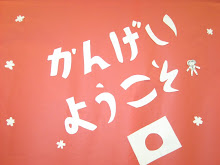Wednesday: September 9, 2009 A Block One Day
INDEPENDENT STUDY JAPANESE – Third period
Independent Study does not meet on Block One days.
JAPANESE 1 – Fifth period
Handed out workbooks for 1 Kimono. Explanation of writing system in general and hiragana phonetic system in particular – recite syllables in gojuu-on order.
View U. of Illinois “Hiragana” writing demonstration video: あ to お
Homework is pages 14 – 16 [十四、十五、十六] in workbook, which includes character n{g} ん
After several students read from their papers, collect Superhero sentences about “Who Likes Whom”
JAPANESE 3 -- first period
Pranee Pairs spoke about her experiences this past summer in Wakayama City, Japan. Class then developed sentences in Japanese from the information she shared with us.
プラ二―さんのアドベンチャー
プラ二―さん は せいふく を きて いました。
わかやま の おてんき が つゆ でした。
おてんき が あつかった です。
じてんしゃ で こうこう に 行きました。
こと「琴」 を ひきました。
みせ の 中 に おもちゃ のねこ が ありました。
まち は わかやま し でした。
ホーストファミリー の お母さん は きれいな 人 でした。
そして やさしい 人 でした。
ホーストファミリー の おねえさん は 二十五さい です。
Going over yesterday’s handout – verbs in English and te forms – discussion-review of verb groups:
Group 1 “Strong” most numerous, extra i syllable before the masu, use song to figure out how make te form
Group 2 “Weak” easiest to conjugate: take off masu and then add te or other endings
Group 3 “Irregular” only two verbs, します Does, and きます Comes
Homework:
1. NY Times article about Election in Japan – POI
2. be prepared to speak of own summer story
3. requirements page – get it signed
4. quiz on designated verbs from yesterday’s handout:
あけます、あいます、あらいます、かきます、あるきます、よみます、のみます、はなします、さんぽ します、はじまります、まちます、あそびます、かいます、およぎます、かします
JAPANESE 2 -- Sixth period
New Song: Dango-san Kyoudai
The Three Dumpling Brothers
だんご3きょうだい {
だんご3兄弟}
1.くし に ささえて だんご、だんご、
みっつ ならんで だんご だんご
しょうゆ ぬられて だんご だんご
だんご さん きょうだい {Four hand claps}
2.いちばん うえ は ちょうなん、ちょうなん
いちばん した は さん なん、 さんなん
あいだ に はさまれ じなん、じなん
だんご さん きょうだい {Four hand claps}
Begin review of katakana using katakana side of workbook
Handout about daily routine, with vocab for months and days of week on the back.
Homework:
1. complete workbook katakana pages 7 and 8
2. complete daily-routine handout with times of day
Reminder: We all must be polite in the Japanese language classroom. Not only is it important in our lives in general – it is an essential part of Japanese culture. ください、おねがい します、ありがとう、すみません Are the most important words and phrases in Japanese.
JAPANESE 4 and AP – Seventh period
This class does not meet on Block 1 days.
Useful website for vocabulary: search for Denshi Jisho in Google, has vocab and also information on each kanji constituting a word.
About Me

- O.Kimeru
- M.A. 1992 from U. of Chicago; Japan Foundation Fellow in 1987-88; research fellow Yokohama City University; Japanese language teacher since 1991; also taught French (member American Association of Teachers of French), English as a Second Language (to students), methodology of teaching ESL (to Japanese high school teachers), English, Japanese history/culture, drama; in 2002 and 2004, listed in Who's Who Among America's Teachers; member of Chicago Sister Cities Osaka Committee, and chair of its Education Sub-Committee; vice-president Illinois Association of Teachers of Japanese; Payton H.S. World Language Department Chair from 2003-2007, under founding principal Mrs. Gail Ward; taught Japanese and coordinated Japan Exchange at Payton from 2003 to 2010; Japanese teacher at Burr Public School beginning August, 2010
Followers
Blog Archive
-
▼
2009
(146)
-
▼
September
(19)
- September 29, 2009 An Eight Period Day
- September 28, 2009 An Eight Period Day
- September 25, 2009 An Eight Period Day
- Japan Exchange Seminar 2009/09/24
- September 23, 2009 A Block Two Day
- September 22, 2009 A Block One Day
- September 21, 2009 An Eight Period Day
- September 18, 2009 An Eight Period Day
- September 17, 2009 An Eight Period Day
- September 16, 2009 A Block Two Day
- September 15, 2009 A Block One Day
- September 14, 2009 An Eight Period Day
- September 11, 2009 An Eight Period Day
- September 10, 2009 A Block Two day
- September 9, 2009, Wednesday
- September 8, 2009, an Eight Period Day
- Requirements for Kimmel Sensei's Japanese Classes,...
- requirements for Japanese classes, revised Septemb...
- Fall Haiku for the Beginning of School
-
▼
September
(19)